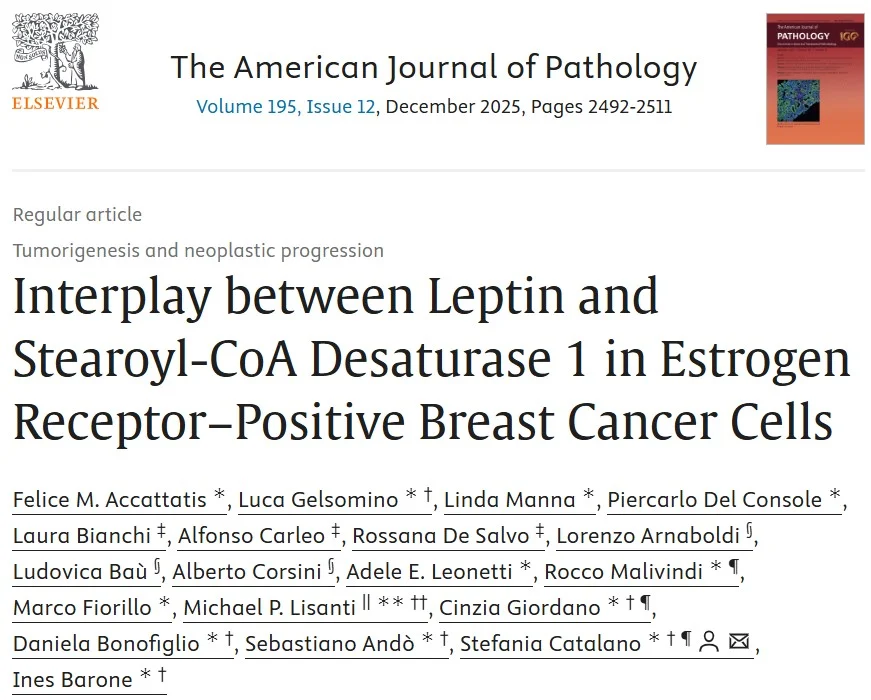Sami Mansfield, Founder of Cancer Wellness for Life, shared a post on LinkedIn about a paper by Stefania Catalano et al. published in The American Journal of Pathology:
“New Research Spotlight: How Leptin and Fat Metabolism May Accelerate ER-Positive Breast Cancer — and Why It Matters for Obesity, Menopause, and Lifestyle Interventions
A fascinating new open-access paper in The American Journal of Pathology uncovers an important metabolic link in estrogen-receptor–positive breast cancer — one that many clinicians feel in practice but haven’t fully understood biologically.
Here’s the big takeaway in plain language:
- Leptin (the hormone that rises with obesity + falls with estrogen loss) can activate an enzyme called SCD1, which shifts tumor cells toward a more aggressive, metabolically efficient state.
- This LEP–SCD1 axis fuels tumor growth, migration, energy production, and recurrence risk—specifically in Luminal A (ER+) breast cancers.
- When researchers blocked SCD1 — either with medication or genetic silencing — leptin’s tumor-promoting effects disappeared.
This matters because:
- Postmenopausal women naturally experience higher leptin and lower estradiol.
- Individuals with obesity also experience chronically elevated leptin.
- ER-positive breast cancers are particularly sensitive to hormonal and metabolic signaling.
In other words: metabolic health isn’t just a ‘nice to have.’
It’s a biologic driver of tumor behavior.
And this paper adds another layer to what many of us in exercise oncology and lifestyle medicine have been working to communicate:
Yes, body composition matters.
Yes, metabolic flexibility matters.
Yes, skeletal muscle is protective.
Yes, nutrition patterns that reduce inflammation and improve lipid biology matter.
Yes, movement is medicine at the mitochondrial level.
But—just as important—
Patients don’t need biochemistry lessons. They need simple steps, support, and systems that help them implement change.
As someone who works every day at the intersection of cancer care, metabolism, and behavior change, this study reinforces why:
We can’t talk about breast cancer without talking about metabolic health.
We can’t talk about obesity without talking about physiology and environment.
And we can’t talk about leptin without talking about lifestyle interventions that actually lower it (sleep, strength training, nutrition quality, stress regulation, and social support).
This isn’t about blame.
This is about biology — and opportunity.
Lifestyle medicine gives us accessible tools to influence pathways we once thought were fixed.
And that gives patients hope and agency.”
Title: Interplay between Leptin and Stearoyl-CoA Desaturase 1 in Estrogen Receptor–Positive Breast Cancer Cells
Authors: Felice M. Accattatis, Luca Gelsomino, Linda Manna, Piercarlo Del Console, Laura Bianchi, Alfonso Carleo, Rossana De Salvo, Lorenzo Arnaboldi, Ludovica Baù, Alberto Corsini, Adele E. Leonetti, Rocco Malivindi, Marco Fiorillo, Michael P. Lisanti, Cinzia Giordano, Daniela Bonofiglio, Sebastiano Andò, Stefania Catalano, Ines Barone
You can read the full article in The American Journal of Pathology.



